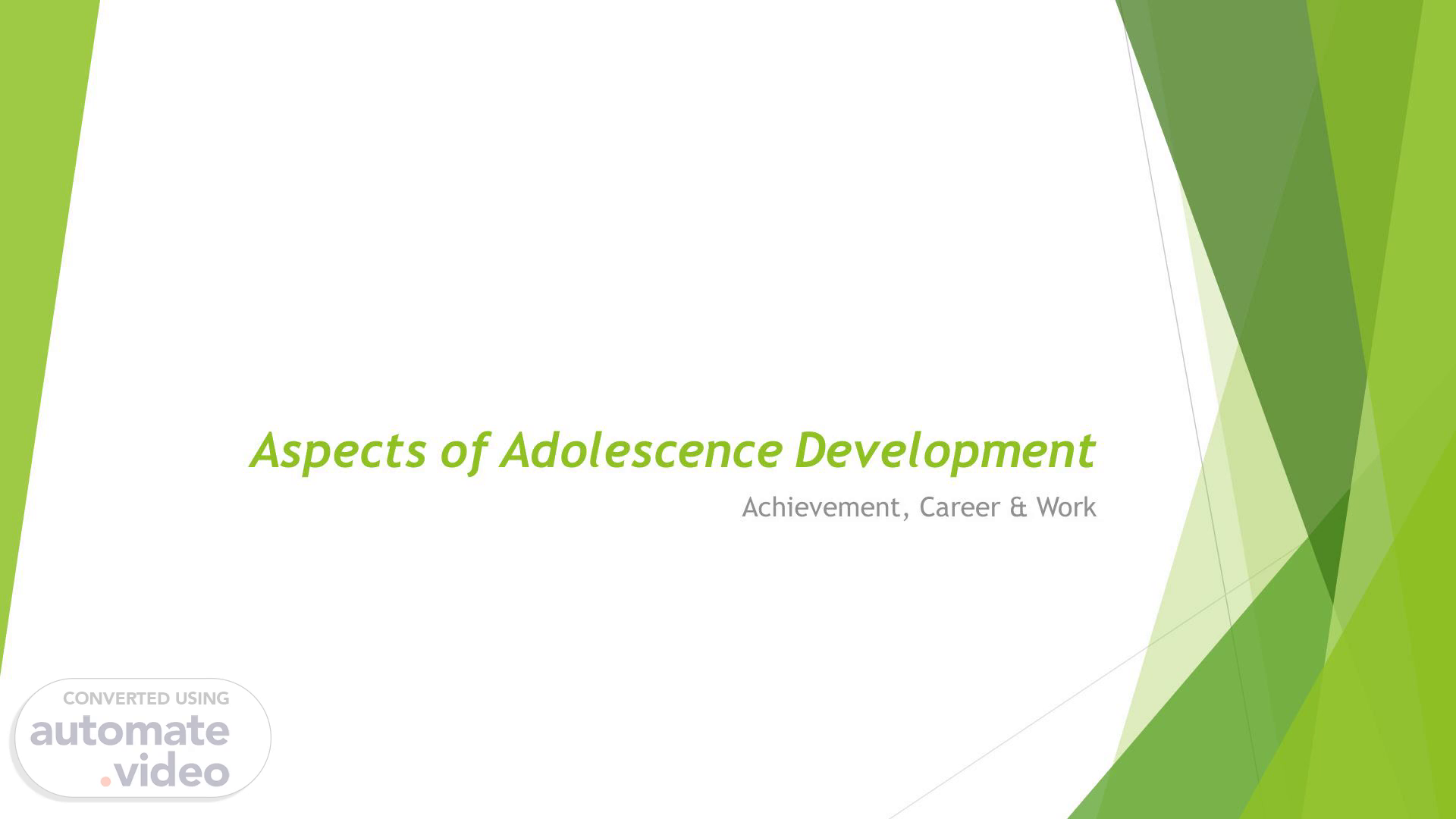
Achievement, Career & Work
Scene 1 (0s)
Aspects of Adolescence Development Achievement, Career & Work.
Scene 2 (6s)
Adolescence Development Overiew The term adolescence comes from the Latin word adolescre, meaning “to grow” or “to grow to maturity”. Ages of adolescence vary by culture. World Health Organization (WHO) defines Adolescence as the period of life between 10 to 19 years of age. Adolescence is a critical period marked by various changes and transitions in physical, cognitive, emotional, social, and moral domains. Today, we will explore how these developmental aspects influence achievements, career choices, and work habits during adolescence..
Scene 3 (30s)
Achievements: Attaining success or reaching a goal, often through effort and determination. Explanation of achievement in relation to adolescence development are:- Academic Achievement: Success in school subjects and examinations. Mastery of educational goals and objectives. Development of study skills and academic motivation. Social Achievement: Building positive relationships with peers and adults. Participation in extracurricular activities and clubs. Developing interpersonal skills and emotional intelligence..
Scene 4 (50s)
Personal Achievement: Setting and accomplishing personal goals. Overcoming challenges and obstacles. Building self-confidence and resilience. Physical Achievement: Improving physical fitness and athletic abilities. Participating in sports competitions or physical challenges. Developing healthy habits and lifestyle choices..
Scene 5 (1m 5s)
Creative Achievement: Expressing creativity through arts, music, or writing. Producing original works or performances. Exploring and developing talents and interests. Career Achievement: Exploring career interests and aspirations. Gaining work experience and professional skills. Setting and progressing toward career goals..
Scene 6 (1m 20s)
Community Achievement: Engaging in community service or volunteer work. Making positive contributions to society. Developing a sense of social responsibility and civic engagement. Personal Growth Achievement: Reflecting on personal values and beliefs. Cultivating self-awareness and introspection. Striving for continuous improvement and personal development..
Scene 7 (1m 35s)
Career exploration: The process of investigating various career options to determine interests, skills, and aspirations. Explanation of career in relation to adolescence development are:- Exploring Interests: Identifying personal interests, hobbies, and passions. Aligning interests with potential career paths. Discovering Strengths and Weaknesses: Identifying personal strengths and weaknesses. Understanding areas of expertise and improvement..
Scene 8 (1m 54s)
Researching Career Options: Seeking information about various professions and industries. Utilizing online resources, career fairs, and informational interviews. Understanding Educational Requirements: Learning about required courses, degrees, and certifications. Exploring educational pathways for desired careers..
Scene 9 (2m 8s)
Exploring Career Pathways: Investigating different career options within chosen fields. Considering factors such as job responsibilities and advancement opportunities. Assessing Values and Goals: Reflecting on personal values, long-term goals, and lifestyle preferences. Ensuring alignment between career choices and aspirations..
Scene 10 (2m 23s)
Gaining Practical Experience: Pursuing internships, job shadowing, or volunteer opportunities. Obtaining hands-on experience in desired career fields. Networking and Building Connections: Engaging with professionals in relevant industries. Attending networking events and joining industry-related organizations..
Scene 11 (2m 37s)
Receiving Guidance and Support: Seeking advice from parents, teachers, mentors, and career counselors. Obtaining support to navigate career exploration processes. Adapting and Revising Plans: Remaining flexible and open to new opportunities. Revising career goals based on changing interests and experiences..
Scene 12 (2m 52s)
Work: Engaging in tasks or activities in exchange for compensation, often to gain experience, develop skills, or contribute to society. Explanation of work in relation to adolescence development are:- Introduction to Responsibility: Part-time jobs or internships introduce responsibility. Learning punctuality, time management, and accountability. Financial Independence: Earning money teaches financial responsibility. Budgeting and saving for future goals..
Scene 13 (3m 12s)
Skill Development: Developing communication, teamwork, and problem-solving skills. Learning customer service and other job-specific skills. Career Exploration: Exploring different career paths and industries. Discovering interests and passions through work experiences..
Scene 14 (3m 25s)
Time Management: Balancing work with school, extracurriculars, and personal life. Prioritizing tasks effectively and managing time efficiently. Work Ethic: Understanding the value of hard work and dedication. Developing perseverance and a strong work ethic..
Scene 15 (3m 39s)
Social Skills: Interacting with colleagues, supervisors, and customers. Developing communication, conflict resolution, and collaboration skills. Building Confidence: Boosting self-esteem through successful work experiences. Gaining confidence in one’s abilities and contributions..
Scene 16 (3m 52s)
Building Confidence: Boosting self-esteem through successful work experiences. Gaining confidence in one’s abilities and contributions. Understanding Workplace Dynamics: Learning workplace norms, etiquette, and expectations. Navigating professional environments effectively for future career success..